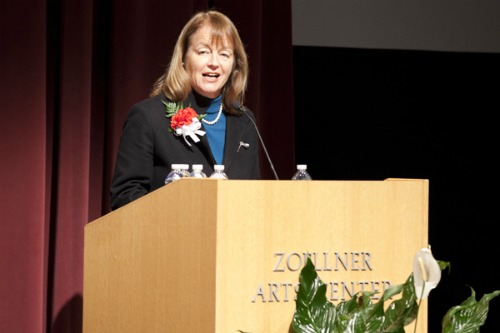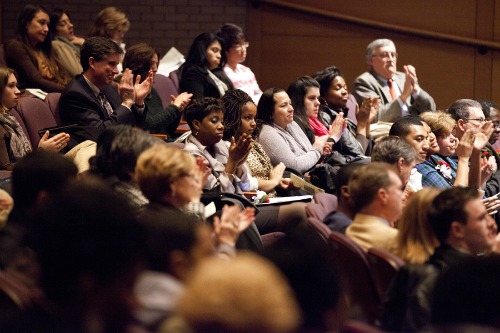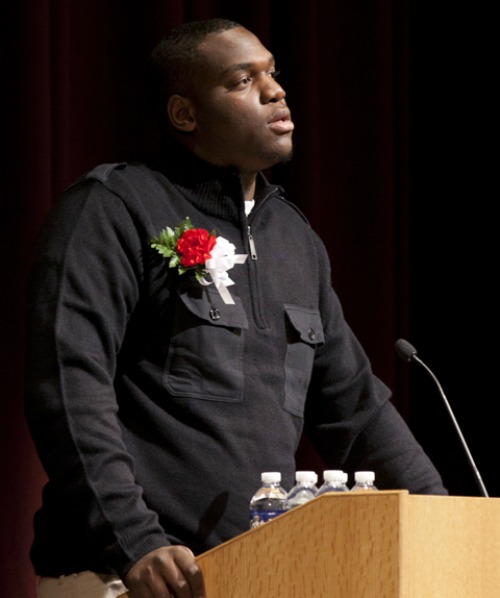Lehigh reflects on King’s legacy
The university kicked off a weeklong celebration of the life and legacy of the Rev. Dr. Martin Luther King Jr. with a two-hour ceremony Monday that featured reflections by students, faculty and staff on the themes that defined the work of the slain civil rights leader.
In brief statements that were, by turns, rousing, thoughtful and somber, members of the Lehigh community shared stories and experiences that embodied King’s messages of non-violence and inclusion.
Their statements were punctuated by video interludes that used King’s words and teachings to shine a spotlight on continuing forms of oppression, including violence against gays, human trafficking and slave labor.
Gordon Moskowitz, professor of psychology, welcomed the crowd of roughly 200 gathered in Baker Hall by reminding them that Lehigh was a very different institution when King was assassinated in 1968. That was three years before the university began admitting undergraduate women.
Today, as the university celebrates the 40th anniversary of women at Lehigh, it offers a thriving Women’s Studies program and the university’s first woman president, who ushered in a number of initiatives to increase diversity.
“These are dramatic changes to our community,” said Moskowitz, who credited President Alice P. Gast with “harnessing the power” of many at Lehigh to achieve those objectives.
Gast said that King “argued passionately for freedom, for dignity, for human rights, and gave voice to the downtrodden and oppressed.
“And always, his words were informed with, as Dr. King himself put it, ‘an abiding faith in America and an audacious faith in the future of mankind.’ In preaching a non-violent revolution, Dr. King appealed to our common humanity and our social values. His words possessed a clarity and a conviction that would not be denied and that would live on.”
She also spoke of the moment when she learned of King’s assassination on the radio, while looking for a new home in southern California with her parents. “This move was the first time in my life that I felt displaced, I felt like an outsider, I started to understand what it meant to be different.”
That sense of displacement was echoed by a number of speakers, including Armando Berdeil, a senior computer science and business major who is the first in his family to attend a college outside of his Puerto Rican homeland.
Ashton Hood, a sophomore political science major from Cincinnati, recalled: When I came to Lehigh, I did experience culture shock. I mean, I didn't see too many people like me. I'm 6-foot-6, a football player, black.
Hood said he called his mother to express his concerns about fitting in at Lehigh, but she calmed him down by reminding him to never forget who you are and where you came from. You just bring that to the table and you'll be fine.
Achieving what alchemists could not
Paul Brown, dean of the College of Business and Economics, detailed a number of “out-of-my-comfort-zone experiences” through the thousands of interactions he’s had with students, professors and colleagues over the course of his academic career. He advised the audience to “embrace surrounding yourself with others who are not like you … it is such a pleasure.”
Others addressed the opportunities provided by their Lehigh experience, and included reflections by Carly Potock, a fifth-year scholar who affectionately described the unique and extraordinary Lehigh classmates who have become her friends, and Ralph Jean-Noel, a first-year marketing major who first discovered a warm and welcoming community among international students in the Pennsylvania Governor’s School for Global Entrepreneurship.
“By the end of that program,” he said, “I had 70 new brothers and sisters. In getting to know them, I was able to look at the world with a new view.”
Rochelle Makela-Goodman, an assistant vice president in advancement, admitted that she learned to hide her Mexican culture in every setting but her home, but came to see diversity as not a mandate or compromise, but a powerful opportunity.
“Today’s complex problems will not be solved with homogenous thinking,” she said. “Our collective wisdom can achieve what alchemists could not.”
She urged the audience to consider joining in this journey, while recognizing that it is not a spectator sport, nor is it a process always marked with the comfort of familiarity.
Alan Snyder, vice president and associate provost of research and graduate studies, echoed similar comments, saying that our “chance to discover is what keeps us alive,” and that the Lehigh community of learners is animated by their differences.
“If we’re all the same,” he said, “who will ask the next great question?”
A number of events honoring King are planned throughout the week. See the full calendar of events.
Photos by Christa Neu
Posted on:




